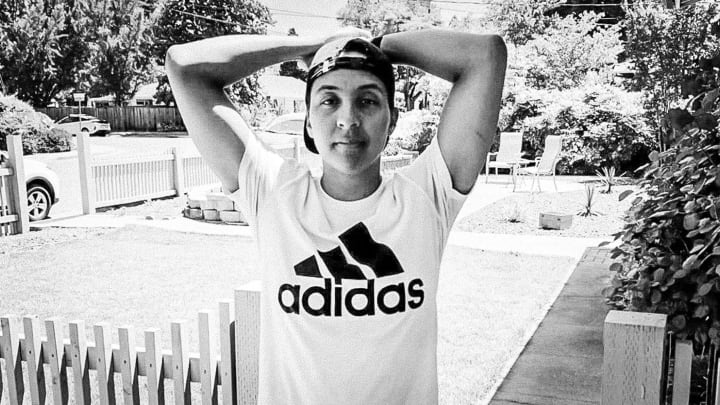
It’s Time to Think Bigger
Growing up I didn’t really worry about race that much. But I did worry about being gay. It was this cloud over my head. This fear of being found out. Race, on the other hand, wasn’t something I agonized over.
My parents, who are white and Black, addressed my race by describing me as “the best of both worlds.” A well-intentioned attempt at a fairy tale of the mixed-race experience. It was one that, in the end, left me wholly unprepared to navigate the world.
All marginalized people know the experience of being out just running some errands, and having to worry about their safety. I would love to not have to ask myself questions like, Is that person following me around the store because I’m Black? Or, Is that guy staring at me because I’m holding my wife’s hand? Is it because they don’t know my gender?
These aren’t just the insecurities of being in a public space, like the way I wonder if I should have looked at my hair before I left the house.
Rather, part of being Black and queer is having to navigate a world that has a layered, palpable threat of violence.
It is processing the daily news cycle of Black men being murdered in the street, while also dealing with the fact that there is a deafening silence when trans and cis women suffer the same fate. It is feeling the possibility of being seen as a threat and a target at any given time.
A few months ago, my wife and I were walking out of a Trader Joe’s. Enjoying the bliss of a pre-COVID-19 life that we didn’t know was about to dramatically change. We were giggling about something, walking to the car holding hands. As we crossed the parking lot I saw this guy start walking toward us. He was tall, white, and wearing camouflage pants with a black shirt. I was wearing a pro-choice WE WON’T GO BACK crewneck.
All marginalized people know the experience of being out just running some errands, and having to worry about their safety.
My wife tensed up. She squeezed my hand.
The man yelled out, “Hey!” Full fight or flight mode.
Then as he approached us he said, “I like that sweatshirt. It’s dope.”
Sigh.
If you aren’t tensed up reading this, it’s most likely because you aren’t Black or a person of color. It might sound dramatic to you. But anyone who is a part of a marginalized group knows what I’m talking about. The queer person just trying to get a drink in the bar, the person chillin’ outside when the cops drive by, the woman walking to her car alone when a stranger walks past her or says hello.
That stress and fear that we live with — it doesn’t come from nowhere. There are real people out there who are fighting to shut us up, quite literally. Murder us. From the police, to transphobes, white nationalists and white terrorists. They hate to see us living loud and proud. How dare we have the audacity to take up space in white America. Our existence is a threat.
Living with this constant stress changes your whole calculus — how you think about yourself, how you move through the world.
Everything is political. My identity, your identity. Even if you don’t want it to be, even if you’ve never voted, or you’re not into politics.
The way we move through this world is po-li-ti-cal.
And that’s why the labels that we give ourselves matter. That’s why I claim them so boldly and loudly. Because they are political statements. And there’s power in them. So, in that way, I try to own it and empower as many people as I can.
It wasn’t until I was a freshman in college and dating a Black woman that I discovered how to define who I was. She and I were having a conversation about how we identify, and at the time, I was still kind of struggling to find my voice within that.
When she said something in reference to me as a “Black woman,” in my head I was like, Wait. Up to that point, I had always just kind of been like, I’m just Layshia, and I play basketball.
A sport that I didn’t realize until much later had allowed me to move freely as a Black, queer kid before I even had the language to articulate who I was. If I had wanted to play tennis or be a swimmer, my experience likely would have been much different and I would have had to grapple with my racial and gender identity much earlier.
I just remember having a mini existential crisis. Like, Who am I?
If I know I’m not necessarily only Black or only a woman — and I’m definitely not a white woman — then who am I?
I remember responding to my girlfriend with something like, “Well, I’m like mixed? I’m not just Black, my dad is white.”
But that was the moment I think I really started to come to terms with everything that we didn’t talk about in my house growing up.
I started to really delve into identity politics and understand how the way that the world sees you also shapes your identity.
It’s not just the stories you tell about yourself.
I started to really delve into identity politics and understand how the way that the world sees you also shapes your identity.
A few years ago, around the time Colin Kaepernick began kneeling during the national anthem, I had lunch with my dad, and we had our first big conversation about race. I remember leaving that lunch thinking, It took this many years of my life, and Colin Kaepernick being blackballed, for my dad and I to have a conversation about race. Wow.
Maybe a year after that, we had another conversation. My dad is big into football — a die-hard Chargers fan. We’ve always been a sports family. He and his girlfriend were at our house, with my wife and my little brother. We were talking about football, and Colin Kaepernick came up, again.
This time, the conversation blew up.
It was the conversation that we see time and time again, where it becomes centered on how Kaep protested, rather than why he protested, and it got heated and emotional. I was crying, my brother was crying, and my dad stormed out of the house.
It was so visceral. What it came down to, for me, was that if my dad, a white man who’s raised me all my life, can’t see beyond his own bias in this moment, then is there any hope for the racist white guy who doesn’t know any Black people? Who’s never raised a Black daughter? Who’s never been around anyone Black?
My dad and I are really close, and we didn’t stay mad forever. But it was deeper than him in that moment. This is the problem with trying to undo systemic racism and the ideas behind it.
They’re so deeply ingrained.
Everybody wants to fight the fight now, in this moment that we have in front of us, with marching, defunding police, and making change.
But there’s still the much larger idea of the bias that’s woven into the fabric of America that will be harder to undo. That’s why we fight for equal rights and systemic change. Because it’s actually harder to change someone’s cultural bias — and dare I say, heart — than it is to change the laws and institutions that enable racists.
Undoing the knee-jerk discomfort of white people to Black people, or Black protests, or Black representation is like trying to unravel a 10,000-count sheet.
That’s why there’s this idea, that many people including me support, that says the whole system has to come down and be rebuilt in a way that makes us actually equal.
We’re facing all of these things designed to keep us down daily.
I want us to remember that our existence truly is resistance. The world is constantly trying to erase people who are like us. People who are, particularly in this time, gaining momentum and power.
Two years ago Black Lives Matter was a controversial, “divisive” thing to say. Now, it’s safe for corporations to tweet. The fact that they have to talk about it is a significant change, but the deeper element is this grassroots accountability that’s come out of it.
It’s not enough to tweet “Black Lives Matter.” We want to know, what does your pay gap look like? What does your board look like? What are your hiring practices?
Are you actually interviewing women, and Black women, and trans people when you hire? What about people with disabilities? Are you truly diverse? Is your office culture fatphobic?
What does your bathroom policy look like? If someone was trans, would they feel safe at work?
What does your health-care policy look like for the trans person in your office?
I want us to remember that our existence truly is resistance. The world is constantly trying to erase people who are like us.
There’s a deeper level of social accountability that’s happening online when companies come out with these statements. We’re not gonna let you just throw a BLM sticker on everything.
Look at the Pride parades. Pride is something that corporations have co-opted, and sometimes in the past, they’ve gotten away with throwing a sticker on things. Before, during Pride Month, it was just the fact that your employer put up a rainbow or would say it was doing a Pride event was like, Wow.
That stuff’s important, and that made us feel seen. Cultural evolutions matter. But now, only doing a Black Lives Matter sticker is not enough.
Because saying “Black lives matter” doesn’t stop the police from killing us. It doesn’t stop the violence. It doesn’t stop mass incarceration. It doesn’t give Black people economic equality. It doesn’t give us fair housing.
People are so fed up and aware of the tactics that we’re fighting back even more. A few weeks ago, the idea of L.A. defunding the police by $150 million would have been unimaginable. Now it’s policy.
Someone recently said to me that at one time the WNBA was once unimaginable. The most radical ideas aren’t that far-fetched.
Thinking BIG is really what we need at this moment.
Can we dare to imagine a world where racism doesn’t pervade everything? I have to, in order to have hope. Because if not, what else am I fighting for?
I believe in the possibility of change.
I believe we can dismantle these systems, to their very foundations, and build something new.
I believe we can have social accountability without police.
We can have an America that doesn’t thrive on the exploitation of its most vulnerable.
It’s time to think boldly about what a reimagined world can look like. Because we have the political power to change it in ways my generation has never seen before.
If it doesn’t scare you, you aren’t thinking big enough.
And it’s time to think bigger.

